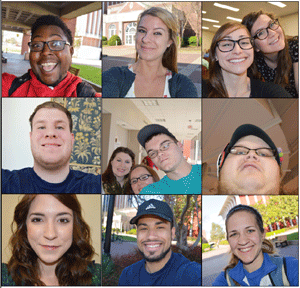How college students turn the lens on social media and their own self confidence
Story by Brianna Willis, Staff writer

Murray State has its own Snapchat, many student organizations have Twitter accounts and President Bob Davies is known for taking selfies all over campus.
Nationally, students under the age of 19 are called “The Selfie Generation,” as a subset of the generation of students that were born between the late 1990s and early 2000s, according to Forbes.
Walking through campus, students can be seen snapping pictures, adding Murray State specific filters and uploading these selfies to social media. This phenomenon does not exist in isolation; rather, communities everywhere are experiencing this new wave of selfie culture.
According to Forbes, “It’s a real-life experiment with real-life implications.”
For many older students, selfies are a means of passing time. Brett Mayberry, junior from Mt. Carmel, Illinois, said for him, selfies are just meant to be silly.
“I took a day to just take selfies around my house,” said Mayberry. “Mostly because I was bored.”
Grant Knox, junior from Lexington, Kentucky, agreed. He said for him, selfies aren’t meant to be serious.
However, for many, social media and selfies are serious. CNN did a special titled “#Being13,” a multi-segment special feature on teenagers in the United States. CNN collaborated with the University of Texas Dallas Child Clinic to do a study on 13-year-olds and their interactions with social media. One of the findings said that many teenagers go online to monitor their popularity status, as well as monitoring their friends’ activity.
According to CNN, “61 percent of teens said they wanted to see if their online posts are getting likes and comments” and “36 percent of teens said they wanted to see if their friends are doing things without them.”
This verification of popularity affects more than just 13-year-olds. Austin Herald, senior from Murray, said a lot of people his age seek validation through social media and selfies.
“It is like an ego booster,” he said. “People will say, ‘Oh, I’ve got more likes than you,’ but it isn’t real.”
Knox said that it is a faux self-confidence, and people are even losing communication skills since interactions are being held behind portable screens.
“During the blackout the other day, people were worried about their phone dying or their laptop dying,” he said. “It became real that we actually had to talk to each other.”
Selfies may be all fun and games, but no matter a person’s intent behind the selfie, there are serious effects of taking and posting them.
For women and girls, concerns over body image have begun to rise with the rise of selfies and social media.
BBC News conducted a study in 2014 showing the more women are exposed to selfies of their friends, the more of a negative body image they begin to develop.
According to BBC, “To look at the impact on body image, researchers at the University of Strathclyde, Ohio University and University of Iowa surveyed 881 female college students in the U.S.,” and “It did find a link between time spent on social networks and negative comparisons about body image.”
Even those who consider selfies as silly did have opinions on how to “look good” in selfies.
“It’s all about angles,” Mayberry said. “You can’t take a selfie from a low angle, it shows all your chins.”
While studies show that selfies and negative body images may be closely related, many women, especially celebrities, claim empowerment through selfies.
Kim Kardashian West published a book last year titled “Selfish,” which consists of selfies she has taken over the years. It was 32 on the New York Times Best Seller: Celebrity list, selling more than 32,000 copies in its first three months, according to the Daily Mail.
USA Today ran a body image survey in 2014 that resulted in different conclusions than previously-conducted surveys.
“65 percent [of teenage girls] said seeing their selfies on social media actually boosts their confidence,” said USA Today.
Tags on twitter such as #bodyposi have emerged, in which social media users, predominately women, share selfies of themselves. People find comfort in sharing their selfies with the Internet, but most of the research conducted thus far suggests this is rooted in attachment to likes and retweets.
The debate surrounding selfies as beneficial or detrimental or serious or a tool to combat boredom may continue. However, it is clear that the selfie is here to stay.